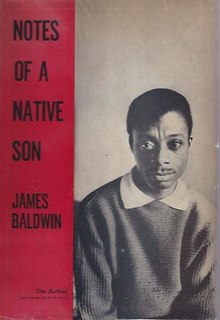Notes of a Native Son

First edition
|
|
| Author | James Baldwin |
|---|---|
| Country | United States |
| Language | English |
| Genre | Essays |
| Publisher | Beacon Press |
|
Publication date
|
1955 |
| Pages | 165 |
Notes of a Native Son is a non-fiction book by James Baldwin. It was his first non-fiction book, and was published in 1955. The volume collects ten of Baldwin's essays, which had previously appeared in such magazines as Harper's Magazine, Partisan Review, and The New Leader. The essays mostly tackle issues of race in America and Europe.
In spite of his father wanting him to be a preacher, Baldwin says he has always been a writer at heart. He is trying to find his path as a Negro writer; although he is not European, American culture is informed by that culture too—moreover he has to grapple with other black writers. Furthermore, Baldwin emphasizes the importance of his desire to be a good man and writer.
Baldwin castigates Harriet Beecher Stowe's Uncle Tom's Cabin for being too sentimental, and for depicting black slaves as praying to a white God so as to be cleansed and whitened. Equally, he repudiates Richard Wright's Native Son for portraying Bigger Thomas as an angry black man—he views that as an example of stigmatizing categorization
Baldwin offers a sharp critique of Richard Wright's Native Son, citing its main character, Bigger Thomas, as unrealistic, unsympathetic and stereotypical.
Baldwin criticises Carmen Jones, a film adaptation of Carmen using an all black cast. Baldwin is unhappy that the characters display no connection to the condition of blacks and sees it as no coincidence that the main characters have lighter complexions.
Baldwin points out that the rent is very expensive in Harlem. Moreover, although there are black politicians, the President is white. On to the black press, Baldwin notes that it emulates the white press, with its scandalous spreads and so forth. However the black Church seem to him to be a unique forum for the spelling out of black injustice. Finally, he ponders on antisemitism amongst blacks and comes to the conclusion that the hatred boils down to Jews being white and more powerful than Negroes.
...
Wikipedia
